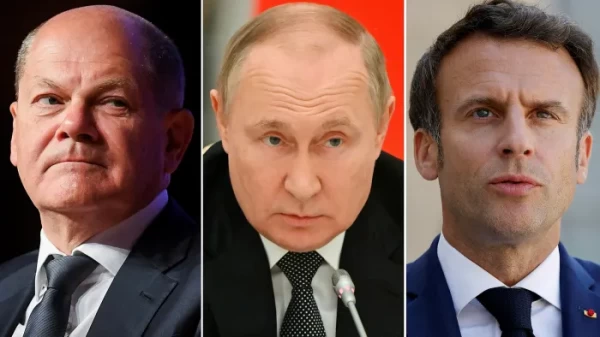
German chancellor Olaf Scholz, Russian president Vladimir Putin and French president Emmanuel Macron Olaf Scholz © Reuters
Politicians in Baltic countries have grown progressively more annoyed about the willingness of their western European counterparts to talk with Putin, reigniting suspicion that some EU countries are pushing Kyiv to cede territory to Russia.
“It is incredible how the leaders of France and Germany are inadvertently paving the way for new acts of violence by Russia . . . How is it possible neither Paris nor Berlin have learned from history? Why is it presumed that Putin, currently waging a war on a major European people, intends to keep any promise?” asked Marko Mihkelson, head of the Estonian parliament’s foreign affairs committee.
The Financial Times also quotes Kristi Raik, director of the Estonian Foreign Policy Institute, as saying that Scholz and Macron risk giving legitimacy to "Putin's lies and unacceptable demands".
"I don't share the view that no Western leader should ever talk to Putin. But the way Macron and Scholz are doing it is not just unhelpful, it is deeply counterproductive," Raik said.
Artis Pabriks, Latvia’s deputy prime minister, said on Twitter: “It seems that there are number of so-called Western leaders who possess explicit need for self-humiliation in combination with total detachment from political reality.”[twitter=https://twitter.com/Pabriks/status/1530807950691926017,w="600",h="500"]
Advertisement / Reklaam
Advertisement / Reklaam
German chancellor Olaf Scholz and French president Emmanuel Macron held a 80-minute phone call with Putin on Saturday in which the Russian president told them Moscow was willing to find ways to unblock grain exports from Ukraine’s Black Sea ports and could increase its own fertiliser and agriculture exports if relevant sanctions are lifted.It came two days after Italian prime minister Mario Draghi also discussed the issue with Putin in an attempt to ease a global food crisis that threatens developing countries in particular.



